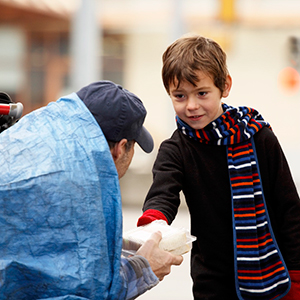- Home
- Our Community
-
Offices & Ministries
- Administrative Offices (A-N)
-
Administrative Offices (O-Z)
- Planning, Properties & Housing
- Public Relations & Communications
- Research
-
Spiritual Affairs
- Home
- Churches and Ecclesial Communities with valid Baptism
- Registration Forms for Baptism, First Holy Communion, Confirmation, and RCIA
- Marriage Preparation
- Celebration of Holy Mass Outside of a Sacred Space Protocol
- Exorcism Protocol
- Healing Service Protocol
- Visiting Clergy-Laity Protocol
- Selected Pastoral Notes on Sacraments and Sacramentals
- Faculties for Clergy
- Temporal Affairs
- Western Bishops Office
- Volunteer Screening
- Pastoral Ministries
- Social Justice & Outreach
- Our Faith
- Outreach
- Contact Us
- Search

Corporal Works of Mercy
For I was hungry and you gave me food, I was thirsty and you gave me drink, a stranger and you welcomed me, naked and you clothed me, ill and you cared for me, in prison and you visited me.' Then the righteous ' – Matthew 25:35-40
1. Feed the hungry

"Feed the hungry (cf. Mt 25: 35, 37, 42) is an ethical imperative for the universal Church, as she responds to the teachings of her Founder, the Lord Jesus, concerning solidarity and the sharing of goods. The right to food, like the right to water, has an important place within the pursuit of other rights, beginning with the fundamental right to life. It is therefore necessary to cultivate a public conscience that considers food and access to water as universal rights of all human beings, without distinction or discrimination." – Pope Benedict, Caritas in Veritate (Charity in Truth), 27.
Lived out in the Archdiocese of Toronto:
- Good Shepherd Centre
- St. Francis Table
- St. Felix Centre
- Out of the Cold
- Canadian Food for Children
2. Give drink to the thirsty
Water plays an important role in Scripture, representing Jesus' desire to return to the Father "O God…my soul thirsts for you" (Ps 63:1). Water also serves as an important symbol in the New Testament, reminding us of the hope of freedom ("They shall hunger no more, neither thirst any more; / the sun shall not strike them, nor any scorching heat" (Rev 7:16)) and as a means of purification, through the waters of baptism.
As Christians, we have a responsibility to ensure access to safe drinking water is a priority: "Access to safe drinkable water is a basic and universal human right, since it is essential to human survival and, as such, is a condition for the exercise of other human rights. Our world has a grave social debt towards the poor who lack access to drinking water, because they are denied the right to a life consistent with their inalienable dignity." – Laudato Si', 30
Lived out in the Archdiocese of Toronto:
3. Clothe the naked
The Bible encourages an attitude of compassion toward nakedness: "Give of your bread to the hungry, and of your clothing to the naked" (Tb 4:16) or "when you see the naked, cover him" (Is 58:7) and praises those who "cover the naked with a garment" (Ez 18:16). In contrast, clothing, particularly white clothing, is often used to mark beings associated with God.
Lived out in the Archdiocese of Toronto:
4. Shelter the homeless (Welcome the stranger)
"I was a stranger and you welcomed me" – Matthew 25:35. Because each person is loved by God and has inherent dignity, we are called to welcome strangers with the love of God and implore our friends to do likewise (Lk 11:5)
Lived out in the Archdiocese of Toronto:
5. Visit the sick

"Illness and suffering have always been among the gravest problems confronted in human life. In illness, man experiences his powerlessness, his limitations, and his finitude. Every illness can make us glimpse death." – Catechism of the Catholic Church, 1500.
Lived out in the Archdiocese of Toronto:
6. Ransom the captive (Visit the imprisoned)
"I was in prison and you came to me" (Mt 25:36). We are called to closeness with those in prison, primarily through our prayers: "remember those who are in prison, as though in prison with them" (Heb 13:3).
Lived out in the Archdiocese of Toronto:
7. Bury the dead
In Judaism, it was a pious practice to bury the dead, as being deprived of burial was seen as a horrible evil (Ps 79:3). The Book of Tobit speak of this practice (1:16 and 12:12)
Lived out in the Archdiocese of Toronto:

